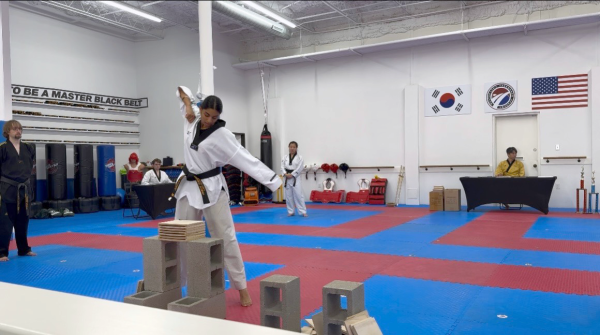Defying gender stereotypes is not for the faint of heart. Upper School students Leila Ashour, Avika Guttigoli and Sara Gupta and Assistant Director of Athletics Jenn Johnson know that better than anyone. Inspired by their experiences participating in traditionally male-dominated activities, they share the pros and cons of taking on this pioneering role.
Leila Ashour: Breaking the Ice
Growing up in a household with two ice hockey playing brothers, it is no shock that junior Leila Ashour grew up with a stick and puck in hand. Originally a figure skater, Ashour quickly realized her passion for ice hockey and joined a coed team as a forward and defender. Even as Ashour’s love for the sport grew, the participation from Dallas-area females remained stagnant.
“It was hard to get the boys to pass the puck to me,” Ashour said. “Coaches would also make fun of me and tell me that there are no girls teams and that I should just stop playing.”
As the only girl on her team, she even changed in a closet while the boys shared the locker room.
Nonetheless, Ashour kept her head up. She continued to play, but the environment remained toxic from the boys on her team, as well as the aggressiveness of multiple girls pining for the small number of spots on the even smaller number of teams.
“My biggest challenge was definitely the competitive environment,” Ashour said. “I played on the same team with the same people for years, and it just got very toxic.”
She did not let the challenging atmosphere reduce her love for hockey. She hopes to take her experience to the Lebanon women’s national ice hockey team, defying the doubts that come with a female in a male dominated sport. Ashour, who also coaches young girls in ice hockey, encourages female players to be confident.
“ It takes a while, but if you are really passionate about it, then you should be practicing every day,” Ashour said. “Don’t let other people ruin the sport for you.”

Avika : Black-Belt Breakthrough
Junior Avika Guttigoli, a taekwondo black belt, enjoys her sport because it increases her confidence and mental strength.
“I really like how disciplined taekwondo is,” Guttigoli said. “Before I started (in fifth grade), I was a shy person. Since joining taekwondo, I’ve gained a lot of discipline, and I’ve really come out of my shell.”
Though taekwondo has been historically considered male-dominated sport, this classification has shifted thanks to a rise in female participants like Guttigoli. Now, her classes are divided evenly between male and female participants, so she does not see taekwondo as a male-dominated activity.
Guttigoli notes that female students are often treated equally, their lessons differing only slightly. She said this has little to do with gender bias, but rather ensuring all students can defend themselves effectively.
“Sometimes the things that they teach us versus the men are different,” Guttigoli said. “When we’re doing gun self-defense, they teach it to us differently, catering to fighting against a man. They really stress on the fact that you have to protect yourself more than they do for the men.”

Sara Gupta : No ROOKie Here
Senior Sara Gupta approaches chess with an optimistic and strategic attitude.
Because there are fewer women participating in chess, they encounter less competition when attempting to achieve high-ranking status. Over time, she has learned to see the advantages of her unique position.
“A lot of the time in chess tournaments when a guy is playing a girl, they underestimate the girl,” Gupta said. “This is a good thing for the girl, because then they can expect you to be worse, and that’s when they get cooked.”
While Gupta mostly notices the benefits as a woman in chess, she also recognizes that there are drawbacks. She said she gets frustrated with her opponents’ aggressive behavior when they lose, something that she believes occurs more frequently with male players than female players.
Gupta noted that there were not many female chess players to look to as role models when she was younger, so every interaction counted.
“It was a good thing for me, when I was younger, that I played separated tovurnaments with just girls because I got to see more girls playing chess,” Gupta said.
Jennifer Johnson: Allowing Girls to Thrive
Assistant Director of Athletics Jennifer Johnson values the way Hockaday provides opportunities for girls in athletics in a world where attention is often focused on male athletes.
“When we travel to other SPC schools that are coed and our game can’t be played until later because the football team has practice, it makes me glad that our priority really is females in sports,” Johnson said.
She said that, in a school without boys, the focus is put only on our female athletes, so that rather than competing for attention and opportunities, they can just compete in their sports.
“I didn’t know how special Hockaday was, as I didn’t grow up in Texas,” Johnson said. “But I’ve been here for 23 years and learned very quickly just how special it is.”
Johnson said she enjoys watching female athletes come together to achieve something they thought they could not do, like the field hockey team’s second SPC championship in 2010.
“Train and go after what you love to do,” Johnson said. “If you are not finding what you need in what is offered for female athletes… push those boundaries and join those male dominated sports or teams.”




